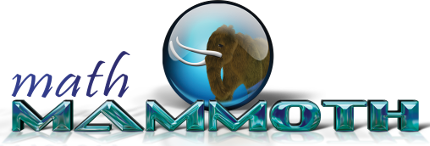Probability of compound events: list the outcomes, draw a tree diagram
We can find the probability of compound events simply by listing all the possible outcomes, and then writing the ratio of the favorable outcomes to the all possible outcomes (as in simple probability).
In the video, I go through three examples. In the first one, I draw a tree diagram for the experiment of tossing a coin, then rolling a die. In the second, we study the experiment of tossing a coin three times in a row. It is easy to simply list all the outcomes. Lastly, we explore the experiment of rolling two dice. I draw a dot diagram and find the probabilities of various events.
This lesson suits grades 7-8, and meets the Common Core standard 7.SP.8a and 7.SP.8b:
a. Understand that, just as with simple events, the probability of a compound event is the fraction of outcomes in the sample space for which the compound event occurs.
b. Represent sample spaces for compound events using methods such as organized lists, tables and tree diagrams. For an event described in everyday language (e.g., "rolling double sixes"), identify the outcomes in the sample space which compose the event.
See also
Math Mammoth Grade 7 curriculum
Practice problems for compound events - video lesson
Receive my monthly collection of math tips & resources directly in your inbox — and get a FREE Math Mammoth book!
You can unsubscribe at any time.
